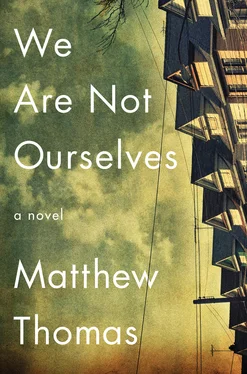When they reached the bridge over the Bronx River a block from the train, his father was the one to stop. He leaned over the stone wall. At first Connell thought his father’s mind was just wandering, but then he wondered whether his father might not be imitating him from a few minutes earlier, so he put one of the bags down and tugged on his father’s sleeve as cars sped past. “Dad!” he said, more exasperated than he had intended. His father shook his head and pointed down at the water. “What is it? What’s up?” Then Connell saw a frog on a rock, lazing in the sun. Maybe this was the frog’s habitual spot. Maybe his father had seen it before and remembered to look for it. He seemed pleased that Connell had been there to see it too. He clapped, and it jumped into the river and left a ripple on the water.
He was half a block away when he saw the 12:23 train pull into the station. If he ran, he could make it. His father looked stooped and pale from the heat and uneasy on his legs. Connell could take the next train, at 12:55, or even the one after it; he had plenty of time to make his flight.
He led him under the tracks to Slave to the Grind, the coffee shop he had haunted all summer.
“Two brain freezers,” he said when they got to the counter. After he’d said it, he felt like a fool. If his father noticed, he didn’t seem to care. Connell bought a corn muffin for them to split. He led him to a table in the back, where they drank and ate slowly.
“I’m sorry to be going so far.”
“Have fun,” his father said. “Study what you want.”
“I’ll miss you.”
“Forget that. Live your life.”
Outside, heat radiated off cars, and the sun pounded through a severely clear sky. The town thrummed with end-of-summer energy. He had another twenty minutes until the 1:23.
“You okay getting back by yourself?”
His father nodded. They walked to the station.
“You didn’t make it to church.”
“That was just as good,” he said, pointing toward the coffee shop.
He watched his father walk off to get the newspaper; then he took a seat in the shade on the cool concrete bench and pulled a book out of his backpack. Thoughts of his father walking home alone to the empty house kept distracting him, so that he had read only a single page when the horn announced the approaching train, but in his flurried efforts to put his book away and get his baggage settled before the train arrived, he was able to forget about his father entirely.
One morning in October, she went to turn the television on for him and found that there was no picture. The repairman couldn’t come in right away, and she had to go to work. She left Ed on the couch, knowing he’d have nothing to do but sit and think. She couldn’t imagine how he’d pass his day without television to distract him from his thoughts.
She hardly got anything done. She must have called him half a dozen times. Every time she called, he hurried off, saying very little, as if he had to get back to something.
When she came home, she found him sitting in exactly the spot she’d left him in on the couch. She wondered if it were possible that he’d sat there for nine hours straight. She checked the microwave and the refrigerator. At least he’d risen to eat. Evidence of urine on the floor of the powder room gave her spirits a strange lift. She was glad she’d called and made him get up.
Another day passed in the same way, and then the repairman finally came on the morning of the third day, before she went to work.
It turned out that all he had to do was reprogram something on the television and the cable box. She gave him a forty-dollar tip on top of the fee his company charged.
“If I ever need you again, please put me at the top of the list.” She tried to affect a breezy manner to hide the desperation she felt. “We simply can’t get on without television in this house.”
Connell stayed up all night trying to finish Crime and Punishment in time for class. In the predawn hours, as he battled fatigue and a fractured consciousness that felt, appropriately given the book in question, something like “brain fever,” the story took on a diabolical urgency, and his experience of it became more personal. It felt as if it could have been the story of the mental collapse of any college-aged kid under pressure, or at least any kid far from home, huddled under a Siberian chill.
At nine o’clock he put his head down to rest his eyes for five minutes. The next thing he knew, the clock said ten fifty and he was scrambling not to be late for his eleven o’clock class. He was once again grateful he’d put in for a single room, because the dorm with the most singles, while being a Brutalist eyesore, also happened to be close to campus.
He threw some clothes on and dashed down the stairs, jumping five or six steps at a time and coming down hard on the landings. He ran through the courtyard of the structure — which was designed by a prison architect and seemed to be made entirely of concrete — and marveled, as he did every day, at how violently it clashed with the neo-Gothic elegance of so much of the campus. He had missed breakfast again. With two classes back-to-back, he would miss lunch as well. He had wasted so many meals in his plan that he could hardly tell the difference anymore between hunger pangs and pangs of guilt. He ate often at the Medici, the Florian, or Salonica, because the theater people he hung around with went to those places before and after practice. They staked out a table and sat at it in shifts all night.
He ran past Rockefeller Chapel and onto the quad. The sprint across the length of the campus to Cobb took his breath away, and by the time he arrived he was panting hard. There was a time when this run would have been nothing to him, but when he decided to pursue the life of the mind, he stopped taking care of his body. He considered it a noble choice, except when he examined the evidence that he was falling apart. His muscle mass had melted away considerably. He was long and lanky and now almost certainly too thin. Instead of gaining the traditional fifteen pounds, he had probably lost twenty. He figured he looked like he was taking drugs, though in fact he was scared to try any. It would have been enough that his father had been a drug researcher, but on top of that, in his father’s Alzheimer’s he had an up-close example of the effects of haywire brain chemistry. He didn’t want to do anything to damage his brain. Of course, he understood that sleep deprivation was as ruinous as many drugs. The strongest drug he ever took was caffeine. He drank coffee throughout the day, enough to make him faintly jittery most of the time. He had a thick eraser of fifties-style hair, and his glasses were big, plastic, and chunky and looked like a stage prop. Once October bled into November, the weather provided the model for the persona so many around him cultivated: brisk, astringent, clarifying, with intermittent flashes of manic warmth.
He paused in front of Cobb to catch his breath and gaze at the indefatigable smokers, who stood in the mouth of the big stone C-Bench in any weather, puffing at Galoises and Lucky Strikes, anything unfiltered, to hurry the heat into their lungs. In the winter, with puffs of condensation escaping lips, everyone on campus looked like a smoker.
• • •
In class, he took a seat at the round table, and then he was snapped awake to see the class all looking at him. The professor had called on him to speculate about what motive Raskolnikov might have had for the killing, beyond his stated philosophical one. Connell replied that he wondered whether Raskolnikov might not have been struggling through some kind of Oedipal problem. His father was dead; there was tremendous pressure on Raskolnikov to succeed, to provide a life for his sister and mother. He had his landlady at his back, a surrogate mother figure. Maybe the pawnbroker was herself a surrogate for those unresolved feelings.
Читать дальше
Конец ознакомительного отрывка
Купить книгу












